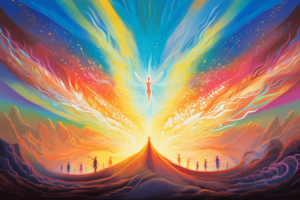Get The Memo.
In the olden days we used to have to do weird but often essential stuff like coal mining, butter churning, switchboard operating, emptying chamber pots, corporal-punishment, and hunting animals.
That was a long time ago.
More recently, and maybe even now in 2023 but certainly not in the months and years afterward, we also did strange stuff.
In the olden days, we used to learn by rote in classrooms of kids with brains that went at vastly different speeds. It was inefficient at best, and some compared it to torture. Each person would spend 10 to 20 years sitting in that environment.
In the olden days, we used to try and operate 2-tonne steel machines by hand and foot. We killed 3,700 people worldwide every day. It was brutal.
In the olden days, we used to get sick a lot. We’d go to these pretend witch doctors who would guess what was wrong, and many times give a very ineffective solution. In the 21st century, your humble author once had a cutting seton installed for months—a treatment first dreamt up by Hippocrates in the 4th century… BC. Be careful when searching for that one. It was messy.
In the olden days, we thought we could use our own biological brains to solve wicked problems like climate change, economics, space exploration, and governance. We thought the louder we shouted, and the more we protested, and the more unamplified minds we threw at it, the quicker it would get solved. We prioritised solving these with our biological intelligence over developing superintelligence to solve them instantly. The hubris was staggering.
In the olden days, we had imaginary lines drawn all over the Earth, defending these territories like animals, and believing that we were somehow disconnected from each other. In some cases, it was nearly impossible to cross these imaginary lines, and even when it was possible, the paperwork was designed to make it unachievable. As an example, the full process for a Chinese citizen to become an Australian citizen took ten years of waiting and thousands of pages of documentation.
Speaking of waiting, in the olden days things took a very long time. Physically moving 100 kilometres took at least an hour. Preparing food was an involved and manual process. If you wanted to have a particular experience, sometimes it took decades to prepare for that.
In the olden days, people used to have jobs. Jobs were a type of servitude bonded to a concept called money. While this kind of ritual employment could be fulfilling, most people despised it, yet spent the majority of their waking hours locked into this work or thinking about work problems. And with very few exceptions, these jobs were useless busy work. They often involved sitting at a desk and looking concerned, thinking of things to write, competing with others, and having group ‘meetings’ to share information verbally. It was a strange time.
In the olden days, we used to elect leadership based on the person’s fame, charisma, money, and marketing. So an entire group of people (sometimes large parts of the Earth) would be run by a single person, often with proven sociopathy, and always with an unamplified brain. We got through many, many centuries like this.
In the olden days, we would entertain ourselves by arguing about the most inane trivialities, blowing them up to appear big and important. Entire subcultures sprung up to develop new conflicts about skin, then men, then toilets, then CEOs, and the list went on forever. There was nothing we wouldn’t argue about, or express an opinion about even if we didn’t really have one. The overriding link was ignorance and belligerence working in tandem, fuelled by trauma and anger. It was exhausting.
In the olden days, the world was almost unimaginably draining. Systems were set up to work against real people.
In the olden days, we covered the surface of the Earth with roads and dwellings. We considered black roads to be essential to our survival. And we thought that these dwellings—houses, apartments, mansions—were a functional way of providing comfort.
In the olden days, disparity was a familiar concept. For many thousands of years, some people had much much more than other people. Remember those jobs we mentioned earlier? Well, the people who actually did the jobs were given tokens or credits at the rate of less than 0.25% of the boss or leader. That means the leader was given 400x as much as the worker. And we thought that was normal. This flowed through to everything. Some lucky people lived in paradise, and some struggled in slums. Some were easily able to live out their dreams, and some were stuck in a living nightmare.
Of course, we know that today we can create our reality instantly. If we want to experience power and domination, we can easily jump into that world and rule over people or things. But nobody would want to do that. We’re too involved in creating new masterpieces, connecting, sharing, and being. Artificial intelligence has become our ally, augmenting and amplifying our ability to do anything.
The olden days seem so far away, but they were only a few short years ago.
Everything and everyone now operates at 1,000x. That means when we were unamplified, we were operating at 0.1% capacity. No wonder we were so frustrated all the time. But we thought that was normal, too.
You have your own examples. What do you remember most about the olden days? What was the most shocking thing that humanity used to do that has now been solved by AI, or soon will be solved by AI?
Get The Memo
by Dr Alan D. Thompson · Be inside the lightning-fast AI revolution.Bestseller. 10,000+ readers from 142 countries. Microsoft, Tesla, Google...
Artificial intelligence that matters, as it happens, in plain English.
Get The Memo.
 Dr Alan D. Thompson is an AI expert and consultant, advising Fortune 500s and governments on post-2020 large language models. His work on artificial intelligence has been featured at NYU, with Microsoft AI and Google AI teams, at the University of Oxford’s 2021 debate on AI Ethics, and in the Leta AI (GPT-3) experiments viewed more than 4.5 million times. A contributor to the fields of human intelligence and peak performance, he has held positions as chairman for Mensa International, consultant to GE and Warner Bros, and memberships with the IEEE and IET. Technical highlights.
Dr Alan D. Thompson is an AI expert and consultant, advising Fortune 500s and governments on post-2020 large language models. His work on artificial intelligence has been featured at NYU, with Microsoft AI and Google AI teams, at the University of Oxford’s 2021 debate on AI Ethics, and in the Leta AI (GPT-3) experiments viewed more than 4.5 million times. A contributor to the fields of human intelligence and peak performance, he has held positions as chairman for Mensa International, consultant to GE and Warner Bros, and memberships with the IEEE and IET. Technical highlights.This page last updated: 1/Aug/2023. https://lifearchitect.ai/olden-days/↑



